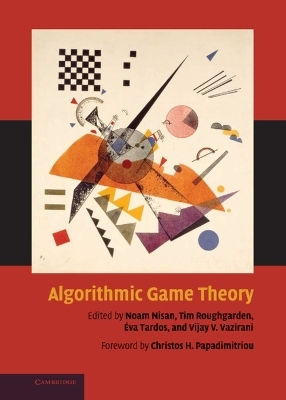
Algorithmic Game Theory
Cambridge University Press (Verlag)
978-0-521-87282-9 (ISBN)
In recent years game theory has had a substantial impact on computer science, especially on Internet- and e-commerce-related issues. Algorithmic Game Theory, first published in 2007, develops the central ideas and results of this exciting area in a clear and succinct manner. More than 40 of the top researchers in this field have written chapters that go from the foundations to the state of the art. Basic chapters on algorithmic methods for equilibria, mechanism design and combinatorial auctions are followed by chapters on important game theory applications such as incentives and pricing, cost sharing, information markets and cryptography and security. This definitive work will set the tone of research for the next few years and beyond. Students, researchers, and practitioners alike need to learn more about these fascinating theoretical developments and their widespread practical application.
Tim Roughgarden is an Assistant Professor in the Department of Computer Science at Stanford University. Vijay Vazirani got his Bachelor's degree in Computer Science from MIT in 1979 and his PhD from the University of California at Berkeley in 1983. The central theme in his research career has been the design of efficient algorithms. Additionally, he has also worked on complexity theory, cryptography, coding theory and game theory. In 2001 he published what is widely regarded as the definitive book on Approximation Algorithms; this book has been translated into Japanese, Polish and French. He is a Fellow of the ACM.
Introduction Noam Nisan, Tim Roughgarden, Éva Tardos and Vijay V. Vazirani; Part I. Computing in Games: 1. Basic solution concepts and computational issues Éva Tardos and Vijay V. Vazirani; 2. Algorithms for equilibria Christos Papadimitriou; 3. Equilibrium computation for games in strategic and extensive form Bernhard von Stengel; 4. Learning, regret minimization and correlated equilibria Avrim Blum and Yishay Mansour; 5. Graphical games Michael J. Kearns; 6. Cryptography and game theory Yevgeniy Dodis and Tal Rabin; 7. Combinatorial algorithms for market equilibria Vijay V. Vazirani; 8. Computation of market equilibria by convex programming Bruno Codenotti and Kasturi Varadarajan; Part II. Algorithmic Mechanism Design: 9. Introduction to mechanism design (for computer scientists) Noam Nisan; 10. Mechanism design without money James Schummer and Rakesh V. Vohra; 11. Combinatorial auctions Noam Nisan and Liad Blumrosen; 12. Computationally efficient approximation mechanisms Ron Lavi; 13. Profit maximization in mechanism design Jason Hartline and Anna Karlin; 14. Distributed algorithmic mechanism design Joan Feigenbaum, Michael Schapira and Scott Shenker; 15. Cost sharing Kamal Jain and Mohammad Mahdian; 16. On-line mechanisms David C. Parkes; Part III. Quantifying the Inefficiency of Equilibria: 17. Introduction to the inefficiency of equilibria Tim Roughgarden and Éva Tardos; 18. Routing games Tim Roughgarden; 19. Inefficiency of equilibria in network formation games Éva Tardos and Tom Wexler; 20. Selfish load-balancing Berthold Vöcking; 21. Efficiency loss and the design of scalable resource allocation mechanisms Ramesh Johari; Part IV. Additional Topics: 22. Incentives and pricing in communication networks Asuman Ozdaglar and R. Srikant; 23. Incentives in peer-to-peer systems John Chuang, Michal Feldman and Moshe Babaioff; 24. Cascading behavior in networks: algorithmic and economic issues Jon Kleinberg; 25. Incentives and information security Ross Anderson, Tyler Moore, Shishir Nagaraja and Andy Ozment; 26. Computational aspects of information markets David M. Pennock and Rahul Sami; 27. Manipulation-resistant reputation systems Eric Friedman, Paul Resnick and Rahul Sami; 28. Sponsored search auctions Sebastien Lahaie, David M. Pennock, Amin Saberi and Rakesh V. Vohra; 29. Algorithmic issues in evolutionary game theory Michael Kearns and Siddharth Suri.
| Erscheint lt. Verlag | 24.9.2007 |
|---|---|
| Zusatzinfo | 36 Line drawings, unspecified |
| Verlagsort | Cambridge |
| Sprache | englisch |
| Maße | 185 x 259 mm |
| Gewicht | 1590 g |
| Themenwelt | Informatik ► Theorie / Studium ► Algorithmen |
| Mathematik / Informatik ► Mathematik ► Angewandte Mathematik | |
| Mathematik / Informatik ► Mathematik ► Finanz- / Wirtschaftsmathematik | |
| ISBN-10 | 0-521-87282-0 / 0521872820 |
| ISBN-13 | 978-0-521-87282-9 / 9780521872829 |
| Zustand | Neuware |
| Haben Sie eine Frage zum Produkt? |
aus dem Bereich


